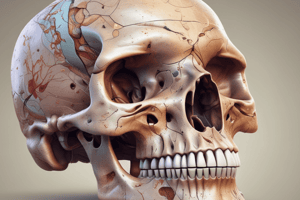Podcast
Questions and Answers
Explain the composition of blood and its major components.
Explain the composition of blood and its major components.
Blood is composed of about 55% plasma and 45% three major types of cells: red blood cells (erythrocytes), white blood cells (leucocytes), and platelets (thrombocytes).
What are the general functions of blood?
What are the general functions of blood?
The general functions of blood include respiration, temperature regulation, nutrition, excretion, immunity, transportation of hormones, water balance, regulation of osmotic pressure, regulation of acid-base balance, regulation of ionic equilibrium, and regulation of blood pressure.
Describe the composition of plasma and its major components.
Describe the composition of plasma and its major components.
Plasma is composed of 90% water and 7.1% plasma proteins, including plasma albumin (4-4.5 gm%), plasma globulins (2.5 gm%), and blood coagulation factors such as fibrinogen (400 mgm%) and prothrombin (10 mgm%).
What is the albumin/globulin ratio (A/G) in plasma?
What is the albumin/globulin ratio (A/G) in plasma?
What are the functions of the blood coagulation factors in plasma?
What are the functions of the blood coagulation factors in plasma?
Flashcards are hidden until you start studying
Study Notes
Composition and Functions of Blood
- Blood is composed of about 55% plasma and 45% three major types of cells: red blood cells, white blood cells, and platelets.
- Functions of blood include respiration, temperature regulation, nutrition, excretion, immunity, hormone transportation, water balance, osmotic pressure regulation, acid-base balance regulation, ionic equilibrium regulation, and blood pressure regulation.
- Plasma is composed of 90% water and 7.1% plasma proteins, including plasma albumin and plasma globulins.
- The albumin/globulin ratio (A/G) in plasma is 1.2-1.6.
- Blood coagulation factors found in plasma include fibrinogen (400 mgm%) and prothrombin (10 mgm%).
- Blood carries oxygen from the lungs to the tissues and carbon dioxide from the tissues to the lungs.
- It transports food absorbed from the intestine to the cells.
- Blood also carries waste products to the excretory organs.
- It transports white blood cells and antibodies for immunity.
- Blood also carries hormones from the endocrine glands to regulate organ functions.
- It plays a role in regulating water balance and osmotic pressure.
- Blood is also involved in regulating acid-base balance, ionic equilibrium, and blood pressure.
Studying That Suits You
Use AI to generate personalized quizzes and flashcards to suit your learning preferences.




